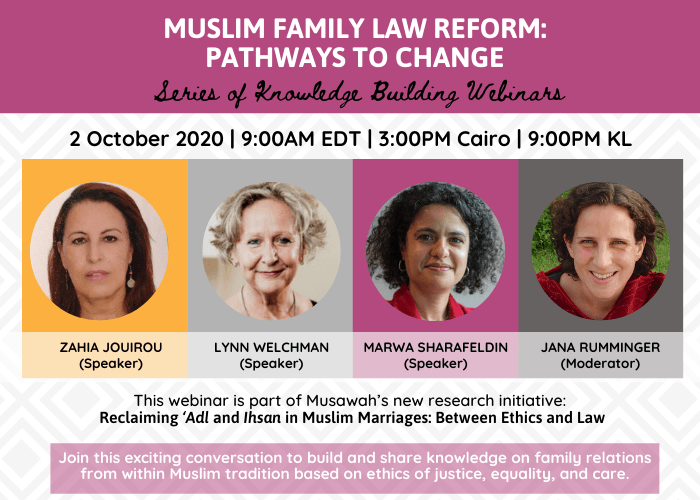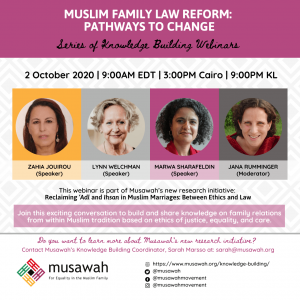
This webinar, titled “Muslim Family Law Reform: Pathways to Change,” features the work of Dr. Zahia Jouirou (University of Manouba), Professor Lynn Welchman (SOAS), and Dr. Marwa Sharafeldin (Musawah), and is moderated by Ms. Jana Rumminger (Musawah).
How can recent reforms of family laws in Muslim contexts provide ideas and strategies that can be used to advance gender justice? In this webinar, Dr. Jouirou, Professor Welchman and Dr. Sharafeldin will explore ways in which contemporary family laws and legal practices have been reformed in recent years to embrace gender equality. They will share examples of different approaches that reformers have taken around specific issues such as domestic violence, polygyny, and inheritance. They will examine some of the contexts and factors that have enabled change, including the interplay between Muslim legal tradition, human rights, state laws and societal norms, and critically assess strengths, remaining gaps, and possibilities for future reform.
Do you want to learn more about Musawah’s Knowledge Building research initiative? Contact Musawah’s Knowledge Building Coordinator Sarah Marsso at sarah [at] www.musawah.org.
Webinar Recording:
Muslim Family Law Reform:
Pathways to Change
Muslim Family Law Reform:
Pathways to Change
Speaker bios:
Dr. Zahia Jouirou is the director of the Institute of Translation of Tunis and a professor of Islamic and religious comparative studies in the University of Manouba (Tunis). She specializes in family laws, fiqh, fatwa and usul fiqh. She writes and researches on the historicity of the Islamic legal and jurisprudential system; the roots of discriminatory provisions against women; and the reformist approaches to Muslim family laws, norms and practices. She published more than 20 academic articles and 4 books on the status of women in fiqh-based laws; polygamy and inheritance rights. Her most recent book was published in 2019 and is titled الوأد الجديد مقالات في الفتوى وفقه النساء. Dr. Jouirou is also a member of an active Tunisian network of women’s groups and was engaged in the campaign to safeguard women’s rights in the Tunisian constitution after the revolution. She is the recipient of several awards and distinctions, in 2008 and 2019 she was awarded by the CREDIF price (Centre de recherches, d’études, de documentation et d’information sur la femme) for her writings on women’s issues. In February 2020, she received an award from the Tunisian Minister of Woman, Family and Childhood, in recognition for her precious contributions to improving women’s status and rights in Tunisia.
Dr. Marwa Sharafeldin is an Egyptian scholar activist. She has a PhD in Law from the University of Oxford and is the Senior Technical Advisor and MENA Region Expert in Musawah. Her work covers the intersection between Islamic law, international human rights law, and feminist activism. She has been published in a number of academic books and media platforms covering those topics. She co-founded and/or served on the Advisory Boards of several feminist organizations worldwide such as Musawah the Global Movement for Equality and Justice in the Muslim Family, the Global Fund for Women, the Young Arab Feminist Network, and the Network for Women’s Rights Organisations in Egypt. She contributed to publications such as the UN’s flagship Progress of the World’s Women Report and the UN’s Gender Justice and Law Arab Region Report. She believes in the power of art for social transformation, and is a story collector, performer and writer.
Professor Lynn Welchman teaches at the SOAS School of Law, University of London, United Kingdom, where she specializes in law and society, Muslim family laws, women’s rights and human rights in the Middle East and North Africa. She has published widely in her research areas, including “A Historiography of Islamic Family Law” (in the Oxford Handbook of Islamic Law, 2018), and the books Women and Muslim Family Laws in Arab States: A Comparative Overview of Textual Development and Advocacy (2007) and Beyond the Code: Muslim Family Law and the Shar`i Judiciary in the Palestinian West Bank (2000). Before joining the SOAS staff in 1997, she worked in human rights, primarily with Palestinian human rights NGOs on the West Bank, but also with international human rights organizations, mostly in the Middle East. She is a board member of the Euro-Mediterranean Foundation for the Support of Human Rights Defenders, a member of the International Advisory Board of the Open Society Foundations’ MENA office, and a founding co-editor of the Muslim World Journal of Human Rights and the Oxford Islamic Legal Studies Series. In 2007, she established the International Human Rights Clinic in the SOAS School of Law.
Moderator: Ms. Jana Rumminger has worked with Musawah in a variety of roles since 2007, most recently as a member of the Knowledge Building Working Group. She has been involved in writing and editing many Musawah publications, including co-editing Men in Charge? Rethinking Authority in Muslim Legal Tradition (Oneworld, 2015) with Ziba Mir-Hosseini and Mulki Al-Sharmani. She has worked with a number of women’s rights organisations in South and Southeast Asia and non-profit organizations in the United States. Jana currently lives near Boston, USA; she was based in Southeast Asia from 2004-2015.
Relevant resources:
زهيّة جويرو(2019). الوأد الجديد: مقالات في الفتوى وفقه النساء، دار مسكلياني للنشر
Welchman, Lynn (2018) ‘A Historiography of Islamic Family Law.’ In: Emon, Anver M. and Ahmed, Rumee, (eds.), The Oxford Handbook of Islamic Law. Oxford: Oxford University Press.
Sharafeldin, Marwa (2015). ‘Islamic law meets human rights: reformulating Qiwamah and Wilayah for personal status law reform advocacy in Egypt’. In: Ziba Mir-Hosseini, Mulki Al-Sharmani, and Jana Rumminger, eds. Men in Charge? Rethinking Authority in Muslim Legal Tradition. London: Oneworld.
Welchman, Lynn (2015). ‘Qiwamah and Wilayah as Legal Postulates in Muslim Family Laws’. In: Ziba Mir-Hosseini, Mulki Al-Sharmani, and Jana Rumminger, eds. Men in Charge? Rethinking Authority in Muslim Legal Tradition. London: Oneworld.
زهية جويرو(2014). الإفتاء بين سياج المذهب وإكراهات التاريخ، دراسة في فتاوى ابن رشد الجد، بيروت، دار الطليعة
Welchman, Lynn (2012). ‘Musawah, CEDAW, and Muslim Family Laws in the 21st Century’. In: Anver M. Emon, Mark S. Ellis, and Benjamin Glahn, eds. Islamic Law and International Human Rights Law: Searching for Common Ground?, pp. 309 –322. Oxford: Oxford University Press.
Welchman, Lynn (2007). Women and Muslim Family Laws in Arab States: A Comparative Overview of Textual Development and Advocacy. Amsterdam: Amsterdam University Press.
زهية جويرو(2007) القصاص في النصوص المقدسة، قراءة تاريخية، دار المعرفة للنشر
زهية جويرو(2007) الإسلام الشعبي، دار الطليعة
Welchman, Lynn (2000). Beyond the Code: Muslim Family Law and the Shari’a Judiciary in the Palestinian West Bank: Muslim Family and the Shari’a Judiciary in the Palestinian West Bank. Kluwer Law International.
Welchman, Lynn (1988). ‘The Development of Islamic Family Law in the Legal System of Jordan’. International and Comparative Law Quarterly 37(4), pp. 868–886.

